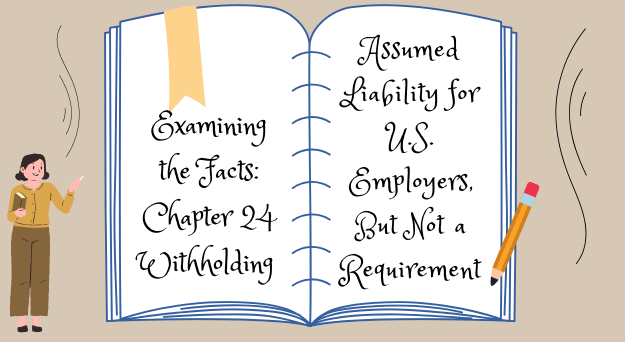The American worker’s productivity dwindles as a substantial part of their wage disappears into the abyss of Federal Income Tax withholding every pay cycle.
Surprisingly, many Americans are unaware that private-sector employers are not obligated to implement Chapter 24 withholding. By submitting the appropriate declaration paperwork to the employer’s payroll department, employees can potentially have no deductions for Federal Income Tax from their paychecks.
According to the Internal Revenue Manual 5.14.10.2.2 (2004), “Private employers, states, and political subdivisions are not required to enter into payroll deduction agreements (meaning Form W-4). Taxpayers should determine whether their employers will accept and process executed agreements before agreements are submitted for approval or finalized.”
Surprising to many, there are lawful American nontaxpayers, as affirmed by a 1972 Federal Appellate Court case: “They (the revenue laws) relate to taxpayers, and not to nontaxpayers. The latter are without their scope. No procedure is prescribed for nontaxpayers, and no attempt is made to annul any of their rights and remedies in due course of law.” Therefore, the IRM section is a ‘procedure’ solely for legal U.S. taxpayers and does not apply to lawful American nontaxpayers.
Private-sector employers are mandated to accept withholding exemptions presented by employees, as outlined in 26 USC 3402(n), explicitly stating:
“Notwithstanding any other provision of this section, an employer shall not be required to deduct and withhold any tax under this chapter upon a payment of wages to an employee if there is in effect with respect to such payment a withholding exemption certificate (in such form and containing such other information as the Secretary may prescribe) furnished to the employer by the employee certifying that the employee:”
In other words, if an employee, under 26 USC 3402(n), certifies through a withholding exemption certificate that they:
- Incurred no liability for income tax in the preceding taxable year under subtitle A.
- Anticipate incurring no liability for income tax in the current taxable year under subtitle A.
Then, private-sector employers are not obligated to deduct and withhold any tax under this chapter from the employee’s wages.
“The Social Security Act does not require a person to have a Social Security number (SSN) to live and work in the United States, nor does it require an SSN simply for the purpose of having one,” states the Social Security Administration in response to the question ‘Can I live and work in the United States without a Social?’
The fact that many private-sector employees have tax withheld unnecessarily is one of the great hoaxes ever perpetrated on the American worker. Rather than protecting the people from the tyranny of out-of-control government, the United States Constitution was deliberately designed to allow the people to govern themselves. And in this republic, where the people are sovereigns, the citizen is king.
“It’s important for the American worker to understand the law and stop letting private-sector employers withhold their property,” says Adele Weiss. “The Founding Fathers fought against tyranny, and it’s our duty to protect our freedoms and liberties by understanding and asserting our rights.”
By understanding the law and asserting their rights, the American worker can take back control over their wages and exercise their sovereignty in the true spirit of the American Republic. The first step is awareness, and the second is action.
The IRS Form 8233 is the mechanism to accomplish this exemption from withholding. It is filled out by the employee and must be accepted by a private-sector employer. The form is available for download here.
“Many people may gloss over this form since it mentions terms like ‘nonresident alien,’ ‘personal services,’ and ‘United States,’ ” says Adele Weiss, founder of Weiss+Associates, a European-based consultancy firm specializing in the Federal Income Tax. “Once people understand the definitions of these terms, they know that Form 8233 applies to them if they work in the private sector in the 50 states of the Union.”
The existence of this form, coupled with the fact that it is up to the private-sector employee to fill out and hand it to the private-sector employer, reinforces the fact that the Federal Income Tax is voluntary as do many other laws and federal documents. Additionally, the Social Security Administration clearly states that a Social Security Number is not required to work in the Constitutional Republic:
“The Social Security Act does not require a person to have a Social Security number (SSN) to live and work in the United States, nor does it require an SSN simply for the purpose of having one,” states the Social Security Administration in response to the question ‘Can I live and work in the United States without a Social?’
The fact that many private-sector employees have tax withheld unnecessarily is one of the great hoaxes ever perpetrated on the American worker. Rather than protecting the people from the tyranny of out-of-control government, the United States Constitution was deliberately designed to allow the people to govern themselves. And in this republic, where the people are sovereigns, the citizen is king.
“It’s important for the American worker to understand the law and stop letting private-sector employers withhold their property,” says Adele Weiss. “The Founding Fathers fought against tyranny, and it’s our duty to protect our freedoms and liberties by understanding and asserting our rights.”
By understanding the law and asserting their rights, the American worker can take back control over their wages and exercise their sovereignty in the true spirit of the American Republic. The first step is awareness, and the second is action.
Constitutional U.S. Citizens are termed by the National Government as ‘nonresident alien individuals,’ as they are nonresident to the District of Columbia/territories and are alien to its municipal rules.
‘Personal Services’ is a unique term and is addressed at IRC 861(a)(3): “…labor or services performed in the United States shall not be deemed to be income from sources within the United States if — (C) the compensation is for labor or services performed as an employee of or under a contract with — (i) a nonresident alien … not engaged in a trade or business within the United States.” The term ‘trade or business’ means “the performance of the functions of a public office” per IRC 7701(a)(26), which is another way of saying: one who works for the National Government.
Weiss adds: “Simply put, if any American does not work for the government, their labor or services performed in the 50 states of the Union are not taxable. This is fully supported by the 16th Amendment’s omission of the Rule of Apportionment.”
In putting this all together, it’s easy to see that Form 8233 is a tool for sovereign Americans living and working in the private sector in the 50 states to eliminate any Chapter 24 withholding for the Federal Income Tax.
“Unfortunately, a few employers are still very uninformed when it comes to the Federal Income Tax and their role in it,” remarked Weiss, who has over 25 years’ experience with the Federal Income Tax. “It’s up to the sovereign American National to educate their employer if they insist on withholding when withholding is not required. In this case, employers are actually breaking the law in what constitutes forced labor.”
Of course, a key element in clarifying an American’s true status is filing a Revocation of Election, a document Weiss’ firm provides to qualified clients to remove them from the U.S. Tax Club for the current tax year plus all future years.
The completed Revocation of Election, a legal process provided to all American Nationals by the U.S. Congress, provides the proof that the American National did not have any income tax liability for the preceding tax year, and that American National does not anticipate having an income tax liability for the current year.








Leave A Comment